#i am pretty sure autistic people did a lot of the pioneering
Explore tagged Tumblr posts
Text
House - "I invented the job"
Saw a lovely post about House being "at the top of his profession," and I just want you to know that House made up "Diagnostician" as a specialty. As of 2004 (and maybe still), no doctor specialized in just the diagnosis aspect of medicine. He invented the job.
House is board-certified in nephrology and infectious disease. Typically he would be in one of those departments, but he decided to create his own that would use his talents to their utmost... and let him have the extreme autonomy he needs to function.
(Oh. Does House have a very high level of demand avoidance? Wow, yes, he does, although in 2004 we called that "being a contrary pain in the ass" or more neutrally "a high drive for autonomy.")
Another way Greg House follows from Sherlock Holmes!
95 notes
·
View notes
Text
Aziraphale, my "adores exams" beloved
Aziraphale, my "same outfit for decades" beloved
Aziraphale, my "I love rules but your rules are ridiculous so I am ignoring them" beloved
Aziraphale, my "arcane details are my jam" beloved
Aziraphale, my "you go too fast for me" beloved
Aziraphale, my "bookshop owner who refuses to part with any books" beloved
I'm not saying Aziraphale is autistic but I am 100% with my whole chest saying Aziraphale is autistic.
how many licenses do you think aziraphale has? hes got one for possession of a firearm, and made them give him a test so he could get one to drive a car. what else has he done in order get a silly little slip of paper that says he can do something cool with a Human Invention? like i know hes a literal angel of heaven but do you think hes ordained
13K notes
·
View notes
Text
An Autistic’s Perspective on Tears of Themis’ Representation (spoiler alert: it’s bad)
Before you read, I should warn you that there will be spoilers for Chapter Five! Read at your own risk. Also, trigger warning for discussions of ableism and harmful disablility stereotypes. I get pretty heated as well, so if you’re not a fan of swearing and stuff, then it might be best to skip this.
So, I was debating whether or not I wanted to talk about this, mostly because this game doesn’t do anything new in regards to the perception of autism in media. Unfortunately, it ends up leaning into a lot of not great tropes and goes into “what the fuck that’s incredibly offensive territory” waaay to quickly. So here I am.
The most prevelant character with autism (or who we start out thinking has autism. Don’t worry, I’ll get to that) is a small, supergenius child (a boy as well *sigh*) is so overdone at this point that there aren’t many new criticisms I can say. The stereotype of autism presented in media is overwhelmingly extremely intelligent (usually with sciency or math based interests) men with no ability to socialize or be kind to others. This not only paints autism as a disability that effects men primarily (which creates intense stigma around AFAB autistic people and makes it harder for us to get diagnosed or believed), but also creates this expectation of greatness. Autistic people are often held to superhuman standards, which further others and dehumanizes us in the eyes of allistic people. The vast majority of autistic people are not savants, and that it perfectly fine.
But all of this is pretty standard. The red flags started popping up when it was revealed that the autistic kid, Hugh, doesn’t actually have autism and is faking it in order to keep people from asking hard questions about him or trying to pry into his life (which is full of secrets). I’m definitely not a fan of perpetuating the idea that people fake diabilities in order to manipulate people, so this plot twist was not my favorite. However, it wasn’t really enough to inspire me to write a whole ass essay about the representation. And then I got to the fucking text conversation with Vyn.
Here is where I’m gonna put a trigger warning for talk about eugenics, curing autism, ableism, and basically just a fuck ton of awful shit. Fuck, this makes me so mad.
So, I went in and took screenshots of both options just to see, and all of them lead to terrible bullshit. Lets start out pretty light with the MC and Vyn discussing symptoms.
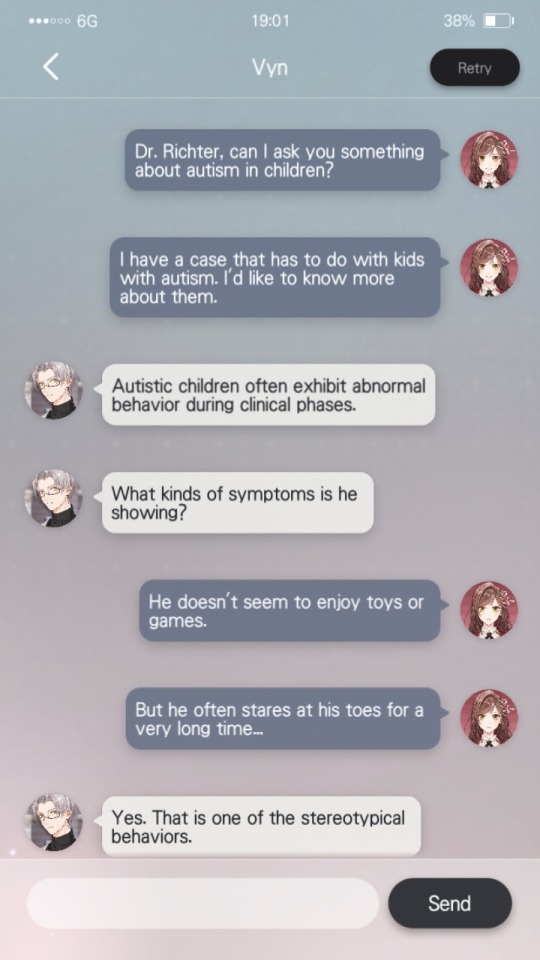
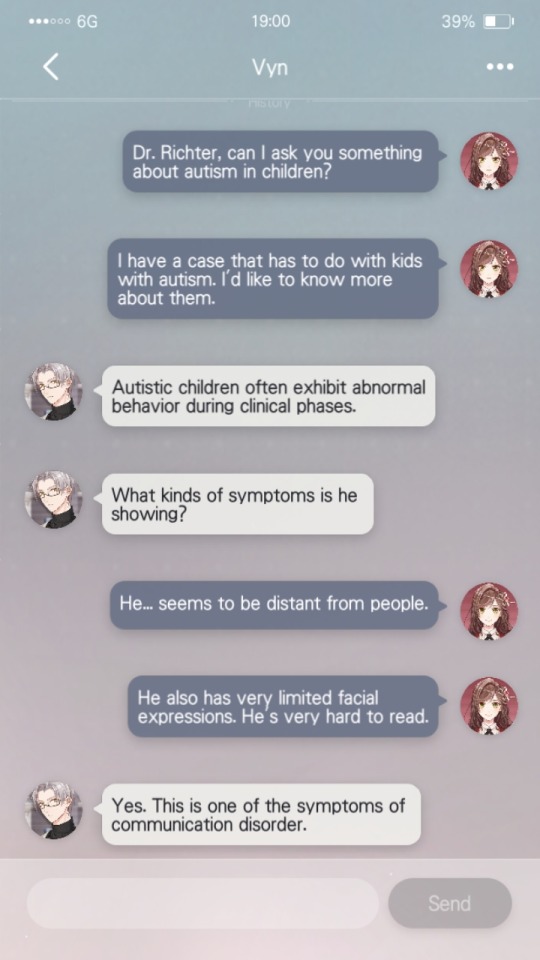
This is a pretty limited and honestly incomplete explanation of autistic behaviors. These can definitely be symptoms, but they’re heavily overcovered and really basic. A lot of autistic people don’t have these symptoms, and it would be really nice if more media branched out and covered more of the spectrum. However, considering they don’t do anything different in any other areas, I’m not surprised.
Also not a fan of Vyn’s use of “abnormal.” It has some very negative connotations and is a bit insulting, honestly. These behaviors are perfectly “normal;” they’re just not as accepted by neurotypical people. Plus, no behaviors can really be labeled as normal because humans are complex and different.
That was the easy shit. Let’s get into the truly awful garbage.
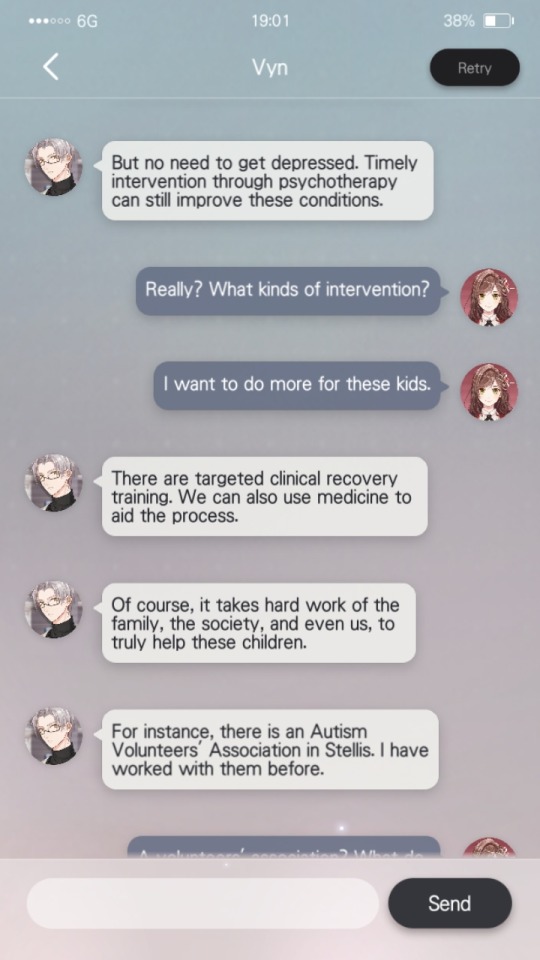
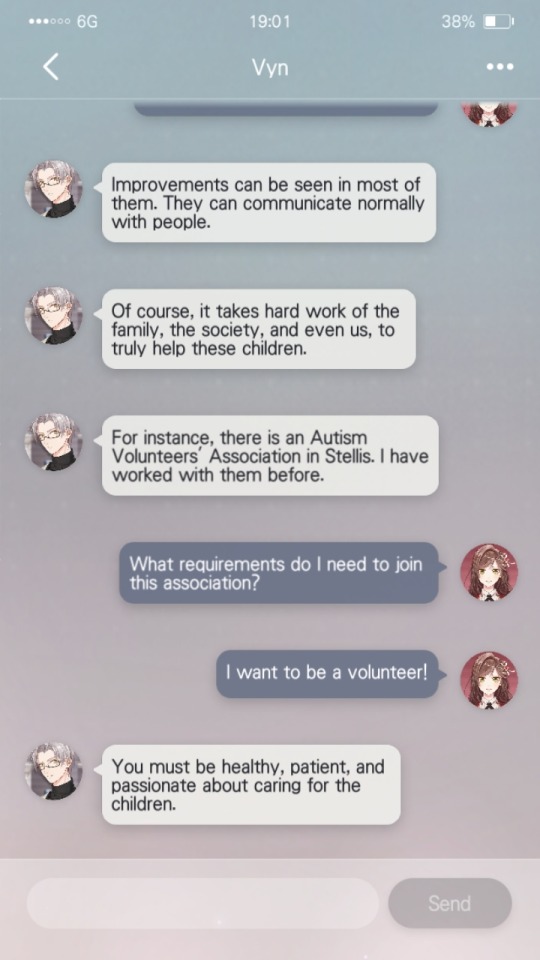
This is treading into ABA territory here. For those of you who are unaware, ABA is pushed as the best autistic therapy, but a large majority of autistic adults consider it to be abusive and unhelpful. This is mainly because it seeks to “correct” many behaviors that are helpful for autistic people. It seeks to surpress stims (which are behaviors that improve the mental health of autistic children), force us to talk (as opposed to letting us use sign language and technology), and more. This harms our mental health and makes us ashamed of who we are. These behaviors do not need to be “corrected.” We don’t need to act “normally.” All this therapy does is make us more palitable for neurotypical people, and it’s bullshit.
It also doesn’t help that ABA was pioneered by Ivar Lovaas, a man who did not believe autistic people were human. He developed ABA as a way to “build a person” using harsh punishments such as withholding affection and ELECTRIC SHOCKS. If you think this is a think of the past, you’d be wrong. Electric shocks are still being used to harm disabled people. Look up the hashtag #StopTheShock to learn more and help push for legislation that bans this practice.
Oh, and did I mention Ivar Lovaas also inspired gay conversion therapy? Because he did! So yeah, fuck ABA and fuck Vyn for performing it (god damn it, Vyn, I liked you a lot).
And now, onto the eugenics. Fuck my life.
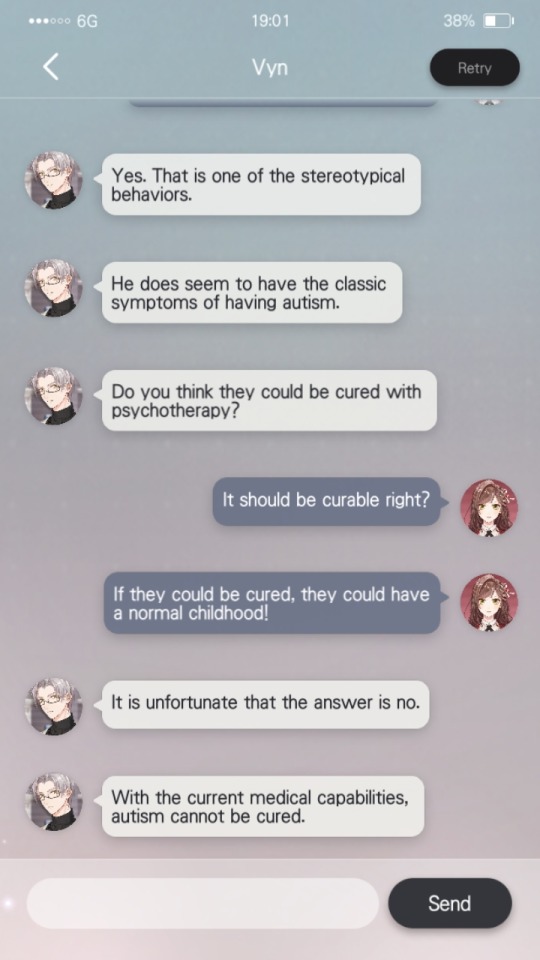
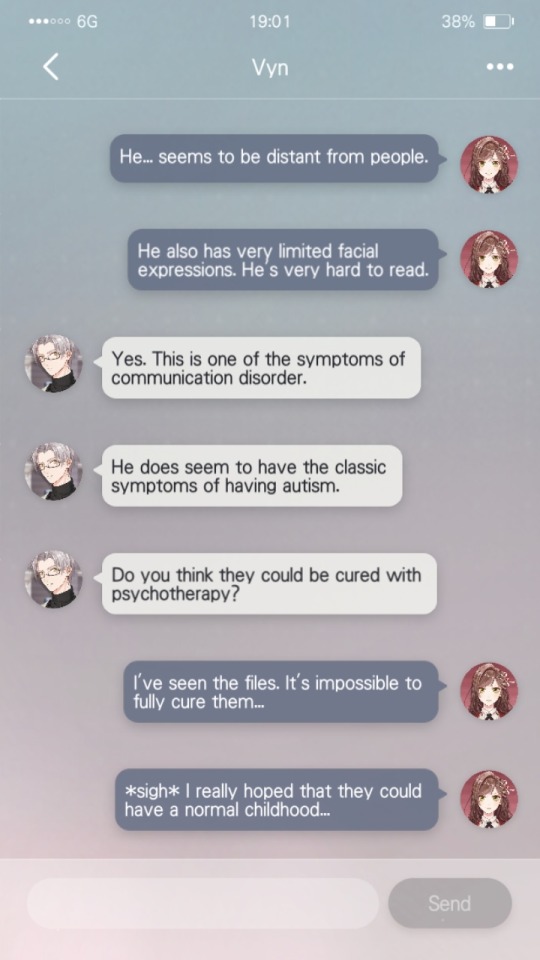
FUCK! THIS! BULLSHIT!
I am so tired of autism being treated as this horrific disease that needs a cure. I had a perfectly fine childhood. Yes, it was hard at times, yes I got traumatized, but a large part of that was due to ableism and abuse from teachers and peers. A large reason why autistic people suffer is because the world is not built for us, and we are often denied accommodations that would make our lives better.
It is beyond offensive and disgusting to suggest that we would be better off not existing than “suffering so much” because of autism. Because that is what this game and everyone else who thinks there should be a cure is suggesting. There is no me without autism. it literally affects my brain structure. You are wishing for a completely different person when you tell me that autism should be cured.
Now, I’m not going to get into the horrible consent issues that arise from talks about a cure, including genetic editing, fear mongering to parents so they think abortion is the only option, and straight up Nazi style eugenics. I do not have the spoons to delve into that exhausting discussion. But if you want to know more, then there are so many incredible autistic people who have written blogs, Twitter threads, and more about why a cure is a terrible idea.
Oh, and if you’re going to come at me with the “severely autistic people should be cured” bullshit, don’t bother. There is no such thing as “severe” autism, first of all, and second, non verbal autistic people (which are who people think of when they talk about “severe” autism), largely don’t want a cure. There have been so many surveys of tens of thousands of autistic people, and the result is that the overwhelming majority do not want to be cured. We want support and proper accommodations. Listen to us.
So, in conclusion, fuck this text conversation and it’s ableist and offensive bullshit. I really wish ToT had stayed away from autism, or at the very least did not touch on therapy or a possible cure. For a game that is about genetic experimentation on children and how bad that is, it sure peddles a lot of eugenics.
Fuck, this text conversation actually made me ill and I hate that. I’m so done with constantly trying to prove to the world that I am a human being who deserves to exist. I’m gonna go cuddle my service dog now.
#tears of themis#vyn richter#autism#autistic perspective#autism representation#seriously can we stop treating my disability like a disease? Is that so fucking hard?#i don't need a cure#i deserve to exist#aba is abuse#autistic people deserve to exist#hugh tears of themis#tot#tot vyn#god damn it vyn I simped for you
133 notes
·
View notes
Text
Monthly Reading List
The best things I found about disability on the internet in June, 2018:
Ban Inaccessibility, Not Plastic Straws Karin Hitselberger, Rooted In Rights - June 7, 2018
I admit that I am still ambivalent about the straw ban controversy within the disability community. Obviously, disabled people who need plastic straws and can’t use other kinds have an important concern that needs to be taken into account, and is instead either ignored or outright disparaged by straw ban supporters. Yet, I do think that reducing plastic straw usage overall is probably a good idea. That’s why I appreciate this article, which offers a reasonable compromise that I think could end up doing most of what straw bands are intended to do.
On Arrested Development, Disability Is a Joke Inkoo Kang, Slate.com - June 8, 2018
When I started the Disability.TV podcast, this is the kind of discussion I wanted to have. I discovered that I’m not that good at podcasting … more specifically, not good at speaking off the cuff. It also felt like discussions about TV and movies in disability culture were pretty binary. Or more accurately, singularly focused on identifying ableist offenses and giving out demerits for them. I certainly think TV continues to earn demerits for ableism, and certainly did when Arrested Development came out, but I like how this piece engages the idea that at different times, imperfect representations may be better than none at all, while probably not deserving a permanent pass.
Jesse Thorn Pays Tribute to Ed Roberts, A Pioneering Leader in the Disability Rights Movement Bullseye With Jesse Thorn - June 4, 2018
I’m a regular listener to Maximum Fun podcasts, which are overseen by Jesse Thorn. And I like Jesse a lot in his role as “Bailiff” for the Judge John Hodgman podcast. I’ve listened to his NPR show Bullseye a few times too, though I’m not a regular. But when Jesse mentioned having talked about Ed Roberts in a recent Bullseye episode, it took me by surprise and I went right to it. What a lovely tribute. Jesse is personal and admiring, but doesn’t forget to explain why Ed Roberts means something to so many people who never met him. This is an essential component of any introduction to the Disability Rights and Independent Living movements.
Please Don't Call My Autistic Son "Buddy." Susan Senator, Psychology Today - June 14, 2018
One of these days I’m going to make a definitive list of things disabled people think and feel that are really hard to explain to non-disabled people. Condescension is one of them, despite the fact that once it is directed to you, the problem with it is dead obvious. This article explains it pretty well.
Iron Man Mike Ervin, Smart Ass Cripple - June 19, 2018
I turned 51 this June. I don’t know if I’m qualified for any senior discounts yet, but this piece sure resonated with me regardless.
2 notes
·
View notes
Text
Representation Matters. And recently, I learned that one of the characters in my books is having a real impact on real people.
For the sake of privacy, I’m not going to tag any specific individuals I spoke with in this post, but this is a true story about how a character with autism in my books has affected people with autism in the real world.
When I began writing Embassy back in 2013, as I’ve said many times, the story/plot were extremely different than they are now. Most of the characters were the same, but they had different roles, and I included many characters just for the sake of including them, as I still wasn’t completely serious nor as dedicated to this series as I am today, January 5th, exactly four years since I began writing Embassy.
But as I completed more drafts of Embassy, and as I experienced various changes in my life (my most life-changing events were yet to come), I came to realize I didn’t want Embassy to be the book it started out being. I wanted it to be something deeper, playing more to the emotions and personal journeys of the characters instead of the outside plots. My purpose for writing Embassy changed. Suddenly there was a dream behind it, a message that would carry on through the unintended sequel, Resonance, and now Perihelid, the final arc of Arman Lance’s emotional journey (and the conclusion of the main themes of the first three books in the series).
Even with this more-intentional purpose shining through all the way to publication, and through the writing and publication of Resonance, too, there were still elements and characters that began to become more and more relevant to the story overall. And, recently, it has been brought to my attention that one of the still-minor characters has been having an incredible effect on some readers of my books that I didn’t quite anticipate: John Mistin.
For anyone familiar with my books, John Mistin is the older brother of Ellin Mistin, and both of them were recruited to the Embassy Program at the same time as Arman Lance (the MC) from their hometown of Cornell, on the planet Undil.
John is a socially-awkward, overly-enthusiastic guy who will give you his unwavering friendship if you so much as let him speak to you. “Hi, I’m John!” followed by a hard handshake is his signature greeting to every new person he meets. He has a form of aphasia, which is sort of similar to dyslexia, but instead of messing up spellings and being unable to read certain words/fonts, he instead routinely confuses complicated words, and Ellin is constantly correcting his mistakes. He’s aware of his aphasia, and he touts his younger sister as “my favorite dictionary.”
John has an “eidetic memory,” that is, an incredible photographic memory that allows him to vividly recall visual-spatial patterns. His life’s dream in the Embassy Program is to become a cartographer and make maps of every city, asteroid field, and planet in the Program, even venturing out on long-duration deep-space missions to map the galaxy with the Undil Embassy’s Horizon Tower. He’s an extremely quick learner with the latest cartographic technology, and is pioneering mapmaking through neuro-optical holography, where he literally creates maps by picturing them in his head and translating them into a 3D space.
He is committed to friendship. His sister, Ellin, is his best friend, and when she’s hurting, all he wants to do is comfort her. He can’t really tell when other people are uncomfortable around him, though, as we see through Arman’s eyes, Arman is at first very apprehensive about being around John, because he just doesn’t know how to “handle” being around him. Fortunately, Ellin is usually there to calm John down when he gets too excited.
I’m describing all of this because yes, John is autistic.
He’s not a main character, and we haven’t seen too much of him yet (proportionately, at least), but he takes control of the scenes he’s in. He’s a very visible character.
This is so, so, so important.
The other day, one of my followers who has read my books messaged me asking if she could ask a question about a certain character. Her question was non-specific, simply, “I don’t know if this was intentional on your part, but what’s the deal with John?”
When I told her that he’s on the autism spectrum, she was thrilled. Like, absolutely thrilled. And she told me that that’s what she thought, but she wasn’t sure if I had meant to write him like that, because the thing with John is that he sticks out from the rest of the cast. And while I’ve written other, less-visible characters in the series, John is the one I’ve paid special attention to because his role in the rest of the series is incredibly important.
The follower went on to tell me that many of her siblings have autism, and that her brother was asking her about my book, particularly about John. And when she told her brother that John was indeed autistic, her brother got really excited, too. Here’s portions of her responses telling me all of this, verbatim:
“You have...no idea how incredibly happy I am right now. Holy shit. I’M- That’s literally exactly what I was- The fact that he is intentionally- AHH. It’s so rare for autistic people to be represented and then- This is something really important to me because most of my siblings are on the spectrum actually.......
“I’ve grown up surrounded by areas of the spectrum and so I recognized that behavior and the fact that it was intentional I’m so freaking happy. Also, Ellin and John’s dynamic reminded me a lot of my own with a lot of my siblings. SO ANYWAYS THAT WAS PROBABLY MORE THAN YOU WANTED TO KNOW BUT YOU HAVE NO IDEA HOW MUCH MY RESPECT FOR YOU JUST ROCKETED....
“You’ve got this utopian-ish universe and there’s characters who are autistic and bi and- It means a lot to me. But I’ve been planning on rereading Embassy and Resonance so I’ll make sure to try to pay more attention to those scenes!......
“And honestly, it’s so important to listen to anyone really, but especially someone with autism bc a lot of people will tell them to shut up instead(I’ll fight people I swear), but it’s also just-the excitement and happiness they get when talking about something they love and actually having someone listen- it’s so great. And yes! So many people look down at people with autism and it’s so- Like all of my siblings and anyone else I know are pretty high-functioning........I mean one brother, he has these intricate worlds in his head and, literally, he can put them all on paper exactly and is just-he’s so talented with art and he’s so passionate and his style is so specific to im and ahhh..........
“OH and I meant to tell you. Last night I was talking to one of my brothers and earlier someone had been telling him about how some people won’t let autistic people do things and he was really frustrated over people being ignorant and judgmental basically, and I told him about how there was a character [in Embassy and Resonance] who was autistic and is important to the series and how positive he is, and then mentioned something about how [you] had also mentioned [you’d] known someone in college who had autism who was really smart and basically he just had this really great smile on his face and it led onto this discussion about how proud he is of his own autism and the things autistic people can do, and while there are crappy people there are some really great people too and he just-the look on his face every time I talked about [John] was just really freaking good. So-thank you. :)”
When I read that last message from her, I cried. I was sitting on my couch and just let the tears flow. To hear that, to hear how your work, how a character you’ve had in your head for years, has affected someone who lives with autism... It’s such a powerful feeling. I was completely overcome, because that is so important.
Just yesterday, I was talking with another friend and we got into a discussion about John Mistin and how a follower on Tumblr told me her story about how John has impacted her and her brother, and my friend then told me that her own brother is on the spectrum, too. I’ve been hanging out with her family more and more recently, and she told me that ever since I’ve started coming over, he’s been calmer, and is interacting with them differently, and making goals for himself to follow through on, and that I’ve had a positive impact on him, too. Even just a few days ago, I showed him this book full of satellite imagery of the Earth, and he was absolutely fascinated by it, and he and I were just sitting at the table flipping through the pages, and he was telling me all these stories about stuff he loves doing and everything he’s interested in.
As she and I were having this discussion, I just started tearing-up right there. It’s just so overwhelming. I cannot express how important it is. I always say that my goal with my books is to inspire a love of space exploration and get people interested in the sciences, but never--NEVER--did I think that my stories would have this impact on the unsung-heroes, some of the best people you will ever meet if you just open yourself to them. Yes, it can sometimes be uncomfortable at first, but there is so much to discover, and so much to love about autism.
Even before my follower and my friend told me about their siblings, I’d already had John’s character-arc planned out. Yes, he has a big role as my books continue. Yes, you will see more of him, and you will continue seeing how good of a person he is, how devoted he is to his work, how genuine of a person he is. But now, even I am realizing how important John Mistin is outside of my books.
Representation matters. It matters because we are so numb to thinking that everyone is the same. That there are heroes and heroines and villains and friends and enemies.
We all have strengths and weaknesses, and none of us are magically good at everything. Sometimes the people we want to avoid at first are the best people we could ever meet. I didn’t write John because I needed diversity. I didn’t write John because I needed a stereotype “crazy” character. I wrote John because he is important to the story, because without him, my books literally would not be the same. And now I know he might be even more important to other people than he is to me.
#Autism#Representation matters#people with autism#books#characters#reading#writing#important#so important
112 notes
·
View notes
Text
Oh God I left that first kin behind years ago.
type “i am” in the tags and whatever comes up first is your new mandatory kin
#i am a professional person at a fortune 500 company#i am 75% of the way through re reading all her books as of today#i am pretty sure autistic people did a lot of the pioneering#i am done with this trope#i am old#i am drinking your milkshake
391K notes
·
View notes
Text
Hello, I am childish*
Have a nice life, Anonymous. Still don't know you, still don't care about your opinion and won't give you a platform for it.
Autistics are my people and deserve everything good in this world.
*Remember, however, that NSFW items may show up at any time on this blog.
1 note
·
View note